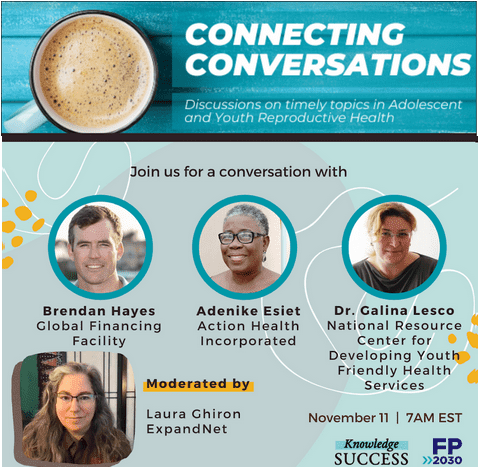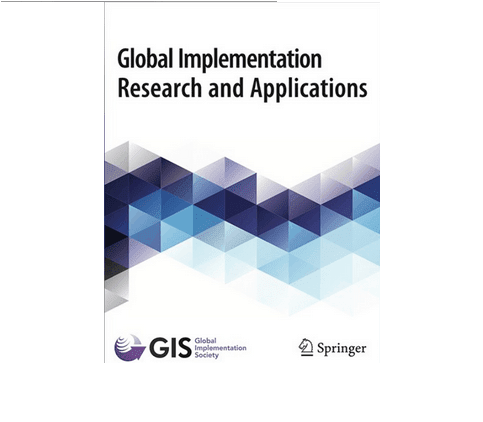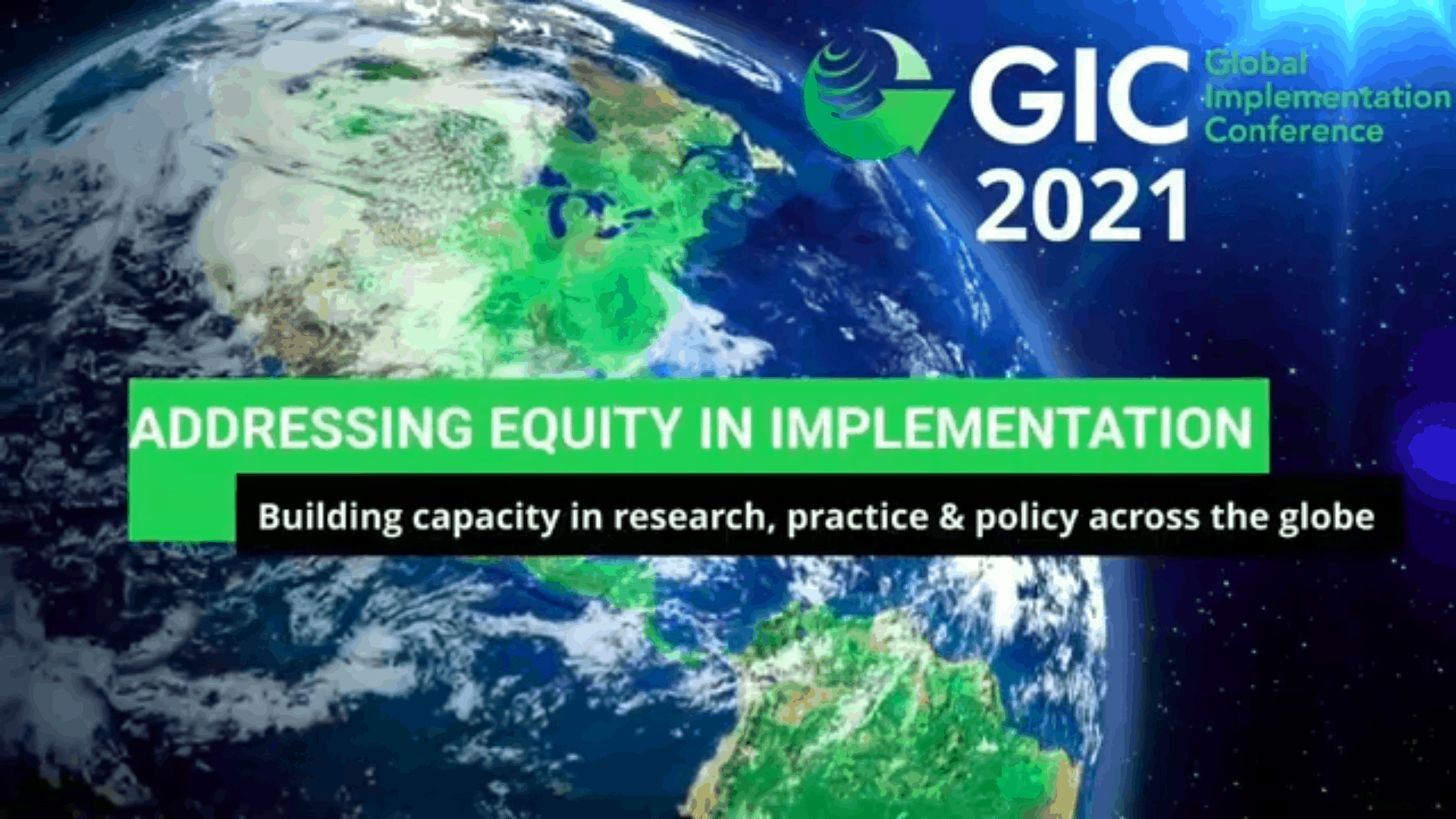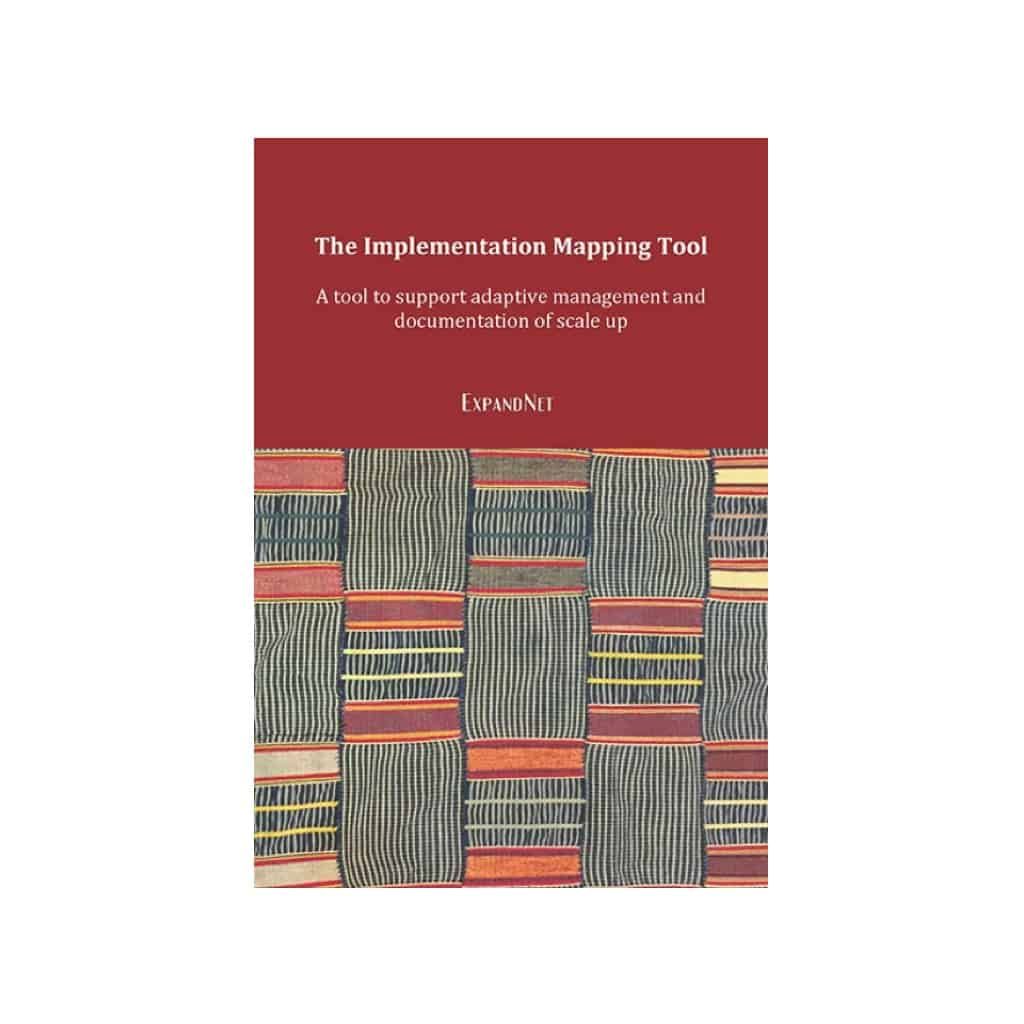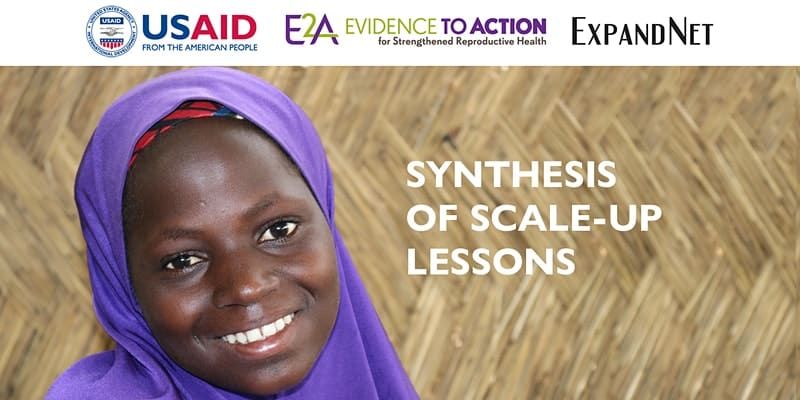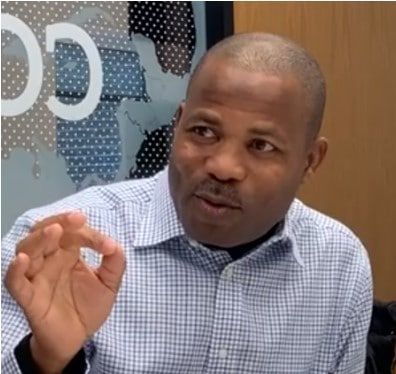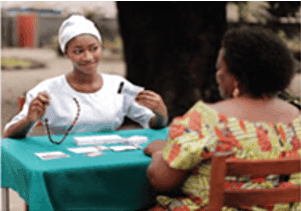News
“If you design your interventions, with stakeholders, for the system, and with the resources that exist in the system in mind, then you’re more likely to arrive to a scalable and more cost-appropriate model,” ExpandNet Secretariat Member Laura Ghiron said in wapping up the panel discussion on scaling up adolescent and youth sexual and reproductive health programming that was hosted by FP2030 and USAID’s Knowledge SUCCESS Project. She went on to say, “At the same time, we need to accept this is not an overnight process”.
In responding to a question asking what are the necessary components, activities, or requirements for effectively scaling up AYSRH program, Adenike Asiet of Action Health Inc of Nigeria said “A starting out place would be a policy that would guide programming.Then a plan should address the different components: teacher training, access to resource materials for the teachers and learners, mechanisms for classroom delivery, a system for monitoring and evaluation”.
Dr. Galina Lesco of the National Resource Center for Developing Youth-Friendly Health Services in Moldova underscored the importance of demonstrating the effectiveness of an intervention using an evidence-based approach. She also emphasized that “One of the lessons that we learned is to have a sustainable financing mechanism in place for the program before we scale. It is important to have a good economic evaluation of the intervention that we want to scale.”
Brendan Hayes of the World Bank’s Global Financing Facility in Uganda said “I do think that as we are working on adolescent health interventions, thinking about how they would be applied or how they would be delivered through existing government systems is really important. It’s not just about having an intervention that can scale, you need systems surrounding that intervention that can help support and continue quality delivery”.
Discussing the financial constraints associated with the COVID-19 pandemic, Brendan added, “The more we can be aligning our work at country level and be guided by the principles that Adenike and Galina laid out very eloquently, the better. It’s important that those conversations are happening and we’re not spreading ourselves too wide and thin. That doesn’t mean that there’s no room for experimentation, or piloting and trying to push the limits, but I do think that as much as we can, building consensus, and building a critical mass of resources behind some real evidence-based and high-impact interventions… are really important.”
The conversation, which took place on November 11, 2021 was part of a long-running series of conversations on adolescent and youth sexual and reproductive health topics and the recording is viewable in both English and French.
The Community of Practice (CoP) on Scaling up Development Outcomes, led by Larry Cooley (Management Systems International) and Johannes Linn (Brookings Institution), organized a webinar on the topic of monitoring and evaluating the institutionalization process during scale up. The August 12th session featured guest speakers from two prominent organizations working on scaling community-based health interventions – Last Mile Health and Living Goods. The session, which was the second in a series of four, focused on perspectives around monitoring and evaluating the process by which initiatives effectively become institutionalized in government programs. To view the recording, please visit this page.
The cases of large-scale interventions that are followed through the series come from the education and health sectors, with the intention of identifying lessons that span sectoral silos. The third session highlighted the donor perspective on these issues on September 20th and featured a panel of experts. The workstream will be featured in a plenary session during the upcoming CoP’s annual workshop scheduled for November. Visit the CoP’s website listed above to join the CoP and any of its working groups – including the Health Technical Working Group, led by ExpandNet – and to be kept apprised of the annual meeting registration and other events of interest to the scaling community.
ExpandNet is pleased to share our latest peer-reviewed scaling-up research, published by Springer Nature in the new journal Global Implementation Research and Application. In the paper, authors Laura Ghiron, Eric Ramirez-Ferrero, Rita Badiani, Regina Benevides, Alexis Ntabona, Peter Fajans and Ruth Simmons highlight how USAID’s global flagship family planning and reproductive health project ‘Evidence to Action’ (E2A) worked with ExpandNet over nine years to implement a scale-up focus in its country activities. The paper provides key learning from this process with the hope that other initiatives can benefit and in turn help countries more rapidly achieve their ambitious Sustainable Development Goals targets and commitments.
Read the open source manuscript here: https://doi.org/10.1007/s43477-021-00013-4
During the May 2021 proceedings of the bi-annual Global Implementation Conference (GIC), ExpandNet members laid out ExpandNet’s systematic approach to scale up and shared experience from using ExpandNet/WHO tools to achieve scale up results. In an “Ask the Expert” session entitled Scale Up and Sustainability in Global Settings, Dr. Alexis Ntabona from the Democratic Republic of Congo and Laura Ghiron from the United States briefly introduced ExpandNet’s framework and scale-up learning from almost two decades of work and responded to participants’ questions about scaling.
Thereafter, a “Master Class” entitled Experience Using ExpandNet/WHO Tools to Achieve Country Ownership and Sustainable, Scalable Implementation Results featured ExpandNet member Charles Kabiswa from Uganda, Dr. Ntabona and Ms. Ghiron. During this session the speakers shared the ExpandNet/WHO framework, tools and approach followed by scale-up experience from: 1) the integrated population, health and environment project HoPE-LVB in Uganda and Kenya that applied ExpandNet tools from the earliest stages of project conceptualization through to management of the scale-up process; and 2) an effort to accelerate implementation of a national family planning reform agenda for integrating contraceptive care competencies in nursing and midwifery training curricula in the Democratic Republic of the Congo.
The next GIC is being planned for 2023 in Colorado, USA, with the hope to have even greater global participation. Stay in touch with the Global Implementation Society and the GIC planning at the following website: https://globalimplementation.org
ExpandNet member Femi Quaitey presented experience from Cross River State (CRS) as part of the proceedings of the Nigeria Family Planning Conference. ExpandNet and Pathfinder collaborated with state government leaders and other stakeholders to develop a scale up strategy to help operationalize the Task Sharing/Task Shifting Policy. Implementation of the 2014 policy has been uneven across the country’s 36 states, so the Evidence to Action Project and Pathfinder International conducted operations research (OR) to determine the feasibility and effectiveness of teaching community health extension workers to insert and remove contraceptive implants. Once results of the OR confirmed the efficacy of the intervention, CRS stakeholders learned about and then applied the ExpandNet/WHO framework and nine-step approach to develop a scaling up strategy. The resulting strategy recommended an increased number of master trainers who could build capacity to implement the intervention among other critical actions. Additional recommendations were made based on the OR project findings, including the importance of adopting a decentralized stepdown training approach, of mobilizing state, national and private sector funding streams to support the scale up process, and of the strengthening quality control plans. Mr Quaitey concluded his 12-minute presentation remarking that using ExpandNet/WHO guidance tools with a resource team of local stakeholders is an approach that can and should be replicated for scale up planning in other parts of Nigeria.
ExpandNet is pleased to share the newly revised version of the Implementation Mapping Tool (IMT), which is the latest addition to our toolkit. This guidance is intended to support projects to use a participatory process to capture and document learning and to engage in adaptive management of the scale-up process. The IMT provides a template to focus discussion and to document key insights based on learning questions related to scale up. This enables teams to identify how and why results were (or were not) achieved throughout the project and to make necessary adaptations.
The IMT was initially developed for application in the field of health. However, to date it has been field tested by projects scaling up interventions across multiple sectors, addressing a range of issues including: family planning and reproductive health, adolescent and youth services, education, changing gender norms and developing health program managers’ capacity to use data for decision making. ExpandNet hopes that organizations and projects will use the IMT and share any learning with its application with us through the Contact us page.
USAID, the global Evidence to Action (E2A) Project, and ExpandNet hosted a virtual event on Wednesday, September 2, 2020 from 11:00 AM to 12:15 AM (EDT). Global and country-based scale up implementers presented key lessons from a synthesis of nine years of experience working systematically with countries to scale up the impact of effective family planning and reproductive health interventions. The following featured speakers helped to demystify a complex process and share useful tips for projects and organizations:
Regina Benevides, PhD, MSc, Gender and Youth Team Lead of HIV Prevention Branch, Centers for Disease Control and Prevention, Center for Global Health (mins 19-30). Oluwayemisi Femi-Pius, MD, Senior Technical Manager, Pathfinder International Nigeria (mins 30-39). Alexis Ntabona, MD, MPH, ExpandNet Consultant and Former Lead of the Technical Support Team, Department of Reproductive Health and Research, WHO (mins 40-49). Patricia MacDonald, RN, MPH, Senior Family Planning/Reproductive Health Technical Advisor, Office of Population and Reproductive Health, USAID (mins 50-59). The panel was moderated by Laura Ghiron, MPH, Scale-Up Advisor for E2A, President of Partners in Expanding Health Quality and Access, Member of ExpandNet Secretariat, and Co-Lead of the Community of Practice on Systematic Approaches to Scale-Up.
Responses to questions that could not be answered during the proceedings are available here. To view the recording, please visit this page.
The Walton Family Foundation invited ExpandNet to collaborate with their Oceans team in working globally towards the ambitious goal of ensuring healthy, sustainable ocean fisheries. The goal of the collaboration is to support the Foundation to bring a strong scale-up perspective to their funded fisheries work and includes two components: first, to strengthen the capacity of the Foundation’s Oceans Team working in Asia and Latin America to internalize scale-up concepts and apply international learning from the use of systematic approaches to scale up; and second, to collaborate with grantees of the Indonesia portfolio to apply the ExpandNet/WHO framework, tools and approach (FTA) to improve the prospects for scale up and sustainability of successful interventions.
ExpandNet members have long understood that the scaling up FTA developed jointly by ExpandNet and World Health Organization in the late 2000s were relevant for work in other sectors. In 2015, the MacArthur Foundation provided funding for ExpandNet to support application of the scaling up FTA in the education sector. Successful scale up results from these collaborations, together with experience from the integrated, multi-sectoral population, health and environment work conducted in East Africa, reinforced the fact that the tools are generalizable across sectors. The current work with Walton Foundation grantees has once again reconfirmed the FTA’s value as being of multi-sectoral relevance.
ExpandNet has been collaborating with the BMGF-funded Technical Support Unit (TSU) project led by Dr. Sada Danmusa who directs the Nigerian NGOs Development Outcomes and Support (DOS) Center and Mid-Space. The TSU project is strengthening the family planning (FP) capacity of state level government leaders to take ownership and more effectively manage the family planning program. The project has utilized various mechanisms to strengthen these leaders’ capacity to use data to set priorities, manage implementation and adapt innovations and best practices for continuous improvement of FP outcomes. One of those mechanisms, the Transparency, Advocacy and Capacity building (TRAC) platform normally supports periodic meetings to build the skills of state leaders from Nigeria’s geo-political zones to use data for decision making and disparity analysis in family planning performance. These efforts combined with other interventions at the federal and state level, have generated new commitments to improve family planning and reproductive health outcomes.
In the current phase the project has worked in two of the six zones of Nigeria. Over the next three years the plan is to scale up the TRAC platform to cover the remaining four geopolitical zones, and thereby all Nigerian states. However, the COVID-19 epidemic is bringing many new challenges as the team cope’s with sustaining activities and planning the next phase of scale up. The ExpandNet Secretariat team discussed with Dr Sada his plans and how he expects to deal with the crisis. To read Dr. Sada’s response to some key questions about how their work is adjusting effectively, click here.
The AcQual Project “Improving Access and Quality of Family Planning Services” tested an innovative approach involving nursing students to provide community-based distribution of family planning services (Approche Apprenants Distributeurs à base communautaire). This was carried out in alignment with ongoing reforms on utilizing a competence-based training within the nursing school program. ExpandNet member Dr. Alexis Ntabona facilitated the efforts to scale up this approach, under the leadership of the 6th Directorate of the Ministry of Health. Results from a recent monitoring exercise assessing the progress indicate that the initiative is widely accepted and supported by all stakeholders, including the nursing schools’ management teams, teachers, students’ parent associations, and family planning clients. However, the results show that the intervention requires mid-course corrections to consolidate its integration within the nursing school system.
- « Previous
- 1
- 2
- 3
- Next »


